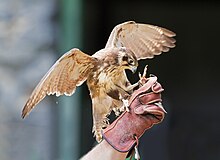Brown falcon
This article needs additional citations for verification. (May 2016) |
| Brown falcon | |
|---|---|

| |
| At Ingham, Queensland, Australia | |
| Scientific classification | |
| Domain: | Eukaryota |
| Kingdom: | Animalia |
| Phylum: | Chordata |
| Class: | Aves |
| Order: | Falconiformes |
| Family: | Falconidae |
| Genus: | Falco |
| Species: | F. berigora
|
| Binomial name | |
| Falco berigora | |
| Synonyms | |
|
Asturaetus furcillatus De Vis, 1906 | |

The brown falcon (Falco berigora) is a relatively large falcon native to Australia and New Guinea.
A number of plumage morphs occur, with the primary distinction being between the pale morph and the dark morph. Both morphs usually have dark brown upper parts and wing coverts. Dark morph birds have predominantly dark under parts, although some light streaking is common. Pale morph birds have white underparts that are varyingly streaked with brown, sometimes heavily so. Pale individuals may also have prominently white under tail coverts and these may be diagnostic. A distinctive aspect of their behaviour is shown in the breeding season when brown falcons make a loud, high pitched, cackle call (like a laying hen) and screeching while in flight.[2]
The species name berigora has Aboriginal origins.
Description
[edit]Adults are usually 40 to 50 cm (16 to 20 in) long. They are found in light and dark forms and a variety of intermediates. Animals typically have red-brown heads with narrow black streaks with a light crown and off-white chin. Wings are a spotted red-brown with dark brown quills. Beaks are light blue/grey; eyes are brown. The falcons make a loud cackle call uttered frequently.
Breeding and habitat
[edit]Brown falcons breed from June to November, usually in an old nest of a larger passerine or another hawk species; they occasionally nest in hollow limbs of trees. The brown falcon lays between two and five eggs that have red and brown spots and blotches.
Subspecies
[edit]- F. b. novaeguineae : central and eastern New Guinea and coastal northern Australia[3]
- F. b. berigora : Australia (except coastal north) and Tasmania
Diet
[edit]The brown falcon eats small mammals, including house mice. They also eat young rabbits in the summer. It also eats small birds, lizards, snakes, and a variety of invertebrates, particularly caterpillars, grasshoppers, crickets, and beetles. Insects form the bulk of the animals' diets during winter and the falcons often chase the insects on the ground.
Behaviour
[edit]Brown falcons and other Australian firehawks have been said to pick up sticks with flames and dropping them to spread fires and prey on escaping animals.[4] According to Audubon, "That anecdotal evidence is sourced from personal testimonies by Australian firefighters and aboriginal people, as well as historical literature, and amounts to 14 firsthand narratives of this specific occurrence."[5][6]
References
[edit]- ^ BirdLife International (2016). "Falco berigora". IUCN Red List of Threatened Species. 2016: e.T22696354A93556228. doi:10.2305/IUCN.UK.2016-3.RLTS.T22696354A93556228.en. Retrieved 12 November 2021.
- ^ "Brown Falcon". Archived from the original on August 31, 2021.
- ^ IOC World Bird List
- ^ Greshko, Michael (8 January 2018). "Why These Birds Carry Flames In Their Beaks". National Geographic. Archived from the original on February 22, 2021. Retrieved 21 October 2022.
- ^ Schmitt, Kristen (February 22, 2016). "Can Birds Actually Start Forest Fires?: Anecdotal evidence suggests that certain birds of prey use fire to their advantage—but the research hasn't been caught on camera yet". Audubon. Retrieved May 18, 2023.
- ^ Bonta, Mark; Gosford, Robert; Eussen, Dick; Ferguson, Nathan; Loveless, Erana; Witwer, Maxwell (2017). "Intentional Fire-Spreading by "Firehawk" Raptors in Northern Australia". Journal of Ethnobiology. 37 (4): 700. doi:10.2993/0278-0771-37.4.700. S2CID 90806420.
Further reading
[edit]- Birds of The World by Colin Harrison and Alan Greensmith
- Complete Book of Australian Birds Reader's Digest
Gallery
[edit](Falco berigora).
-
John Gould illustration
-
Brown falcon portrait
-
Brown falcon
-
In flight in Victoria, Australia
-
Adult, pale morph, Tasmania
-
Adult (pale morph) takes flight, Tasmania
-
Brown falcon perched on thistles near Lake Borrie, Vic.
-
Brown falcon attending prey, Pikedale, S. Queensland








